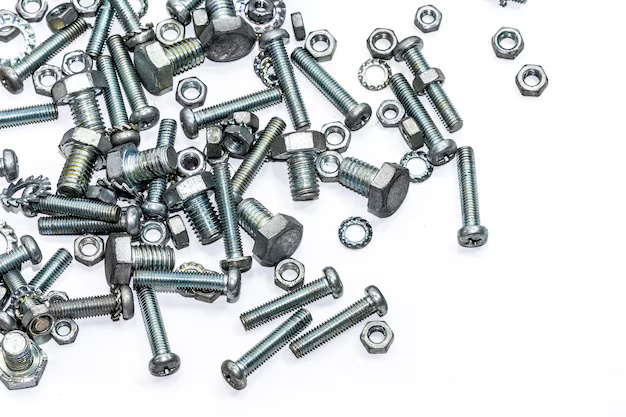Complete Guide to Top Screw and Bolt Suppliers: Features, Standards & Sourcing Tips
Screws and bolts are essential fasteners used in virtually every industry—from construction and automotive to electronics and manufacturing. These components hold structures, machines, and products together. Because of their critical role, sourcing the right type and quality of fasteners from reliable suppliers is fundamental.
Screw and bolt suppliers specialize in manufacturing and distributing a wide range of fasteners designed for specific uses. These may include stainless steel bolts for corrosion resistance, high-tensile bolts for structural applications, or micro screws for electronics. Choosing the right supplier ensures product reliability, safety, and compliance with global engineering standards.
Importance
Screw and bolt suppliers are more than just vendors—they are integral partners in quality assurance and supply chain efficiency. Here's why choosing the right supplier matters:
Key Stakeholders:
-
Construction Firms rely on structural bolts that comply with building codes.
-
OEM Manufacturers require precision screws in bulk with consistent quality.
-
Exporters and Importers must meet international fastener regulations.
-
Automotive & Aerospace Companies need certified, high-tolerance components.
Problems Poor Sourcing Can Cause:
-
Structural Failure: Low-quality bolts may break under stress.
-
Product Recalls: Non-compliance with ISO or ASTM standards can lead to penalties.
-
Production Delays: Inconsistent deliveries or incorrect sizing can halt manufacturing lines.
Sourcing from certified suppliers reduces the risk of failures and improves operational reliability.
Recent Updates
The global fastener market has seen significant shifts from 2023 to 2025, especially in the areas of automation, sustainability, and digital sourcing.
Key Trends:
-
Digital Procurement Platforms: B2B sourcing has moved online via platforms like Fastenal, Alibaba, and IndiaMART.
-
Sustainable Manufacturing: Suppliers are moving toward using recycled metals and eco-friendly coatings.
-
ISO and RoHS Compliance: Growing emphasis on materials that meet environmental and safety regulations.
-
Traceability with QR Codes: Many suppliers now embed batch info for quality assurance via QR tags.
| Trend | Impact | Year Introduced |
|---|---|---|
| QR Code Traceability | Real-time tracking of production lots | 2024 |
| Eco-Friendly Coatings | Reduces environmental impact | 2023 |
| AI-Based Inventory Tools | Optimizes bulk purchasing & logistics | 2025 |
Laws or Policies
Screws and bolts are subject to industry-specific regulations and international quality standards. These vary based on country and application.
India
-
Bureau of Indian Standards (BIS): Sets IS codes such as IS 1367 and IS 1363 for bolts and nuts.
-
Import Regulations: Fasteners must comply with quality control orders (QCOs) for critical industries like railways and defense.
-
GST Compliance: Suppliers must be registered and provide valid tax invoices under the Goods and Services Tax framework.
United States
-
ASTM Standards (e.g., A193, A325): Define mechanical properties and material specs.
-
SAE & ANSI: Used in automotive and machinery applications.
-
Buy American Act: Federal projects may require sourcing from U.S.-based certified suppliers.
Europe
-
EN Standards (e.g., EN 15048, EN 14399): Define performance and safety of structural bolts.
-
CE Marking: Mandatory for certain construction-related fasteners under EU regulations.
Staying compliant ensures product acceptance in global markets and reduces liability.
Tools and Resources
When choosing a screw or bolt supplier, the following tools and resources can assist with planning, calculation, compliance, and comparison.
Fastener Calculators & Design Tools:
-
Bossard Fastener Calculator
-
Nord-Lock Bolt Load Calculator
-
Engineering Toolbox – Bolt Torque & Strength Tools
B2B Marketplaces:
-
Fastenal (US & Global) – Supplier with online sourcing tools
-
IndiaMART (India) – Wide supplier listings for fasteners
-
Alibaba (Global) – Bulk purchase with certifications
Material Compliance Resources:
-
ISO.org – International standard definitions
-
astm.org – U.S. standards for mechanical fasteners
-
rohs.gov – Safety/environment compliance (electronics)
Supplier Evaluation Templates:
-
Quality Checklist for Vendor Evaluation (Excel format)
-
Certification Validation Sheet (ISO, CE, RoHS)
FAQs
What’s the difference between screws and bolts?
Screws are typically used with pre-threaded holes or create their own threads, while bolts require a nut or pre-threaded hole. Bolts are used for high-strength applications where load-bearing is critical.
How can I check if a supplier is certified?
Ask for ISO 9001, ASTM, or BIS certifications. Cross-check serial numbers with issuing authorities or request test reports (Mill Test Certificates or MTCs) for specific materials.
What factors affect screw or bolt quality?
Important factors include material type (e.g., stainless steel, carbon steel), tensile strength, corrosion resistance, and manufacturing tolerances.
Can I import fasteners for commercial use?
Yes, but they must comply with local customs and quality control standards. In India, for example, certain fasteners are included in the Quality Control Orders list and need BIS certification.
How do I choose the right screw or bolt for my application?
Consider factors like load requirement, environment (corrosive, high temperature), thread type, length, and head shape. Consulting a mechanical engineer or using online design tools is recommended.
Final Thoughts
Screws and bolts may seem simple, but their quality and sourcing have far-reaching effects on product durability, safety, and performance. The right supplier offers not only materials but also consistency, compliance, and technical support.
By understanding global standards, recent innovations, and using the right tools, businesses can streamline their procurement process and ensure long-term reliability in every joint and fixture.